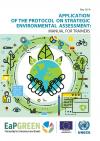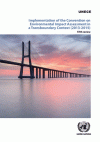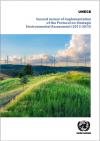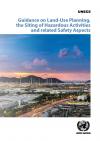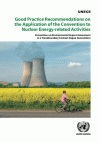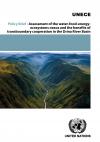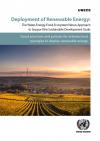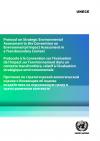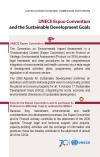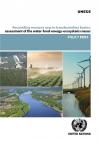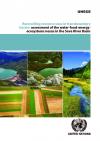Publications
Displaying Results 121 - 140 of 651
- English
This publication presents the Principles for Effective Joint Bodies for Transboundary Water Cooperation that were formally adopted by the Meeting of the Parties to the Water Convention at its seventh session (Budapest, 17-19 November 2015). Countries sharing transboundary waters worldwide are encouraged to make use of them when establishing new joint bodies or strengthening existing ones.The
- العربية
This publication presents the Principles for Effective Joint Bodies for Transboundary Water Cooperation that were formally adopted by the Meeting of the Parties to the Water Convention at its seventh session (Budapest, 17-19 November 2015). Countries sharing transboundary waters worldwide are encouraged to make use of them when establishing new joint bodies or strengthening existing ones.The
- English
The Manual on Strategic Environmental Assessment for Trainers (the Manual) was prepared within the framework of the European Union funded project 'Greening Economies in the Eastern Neighbourhood' (EaP GREEN) that aimed, inter alia, at promoting the use of strategic environmental assessment (SEA) and environmental impact assessment (EIA) as essential tools for supporting environmentally
- English
- English
- English
Practical guidance on reforming legal and institutional structures with regard to the application of the Protocol on Strategic Environmental Assessment ENG/RUSThis practical guidance aims to assist countries of Eastern
- English
This report presents the findings from the assessment of the water-food-energy-ecosystems nexus, linked with a study of benefits of transboundary cooperation, in the Drina River Basin, mainly shared by Bosnia and Herzegovina, Montenegro and Serbia which was carried out from 2016 to 2017 in the framework of the UNECE Water Convention’s Programme of Work. The assessment aimed to foster
- English
The Guidance on Land-Use Planning, the Siting of Hazardous Activities and related Safety Aspects has been developed in close cooperation with the constituencies under three legal instruments of the United Nations Economic Commission for Europe (UNECE) - the Convention on the Transboundary Effects of Industrial Accidents (Industrial Accidents Convention), the
- English
- English
The publication contains the authentic text of the Convention on Environmental Impact Assessment in a Transboundary Context (Espoo Convention) as amended on 27 February 2001 and on 4 June 2004 in English, French and Russian. The second amendment to the Espoo Convention (adopted in
- Pусский
- English
- English
This policy brief synthesizes the main findings and recommendations from the assessment of the water-food-energy-ecosystems nexus ─ essentially of intersectoral links, trade-offs and benefits ─ in the Alazani/Ganykh River Basin, shared by Azerbaijan and Georgia in the Caucasus, that has been carried out in the framework of the UNECE Water Convention’s programme of work for 2013–2015. The
- English
This policy brief synthesizes the main findings and recommendations from the assessment of the water-food-energy-ecosystems nexus, linked with a study of benefits of transboundary cooperation, in the Drina River Basin, mainly shared by Bosnia and Herzegovina, Montenegro and Serbia which was carried out from 2016 to 2017 in the framework of the UNECE Water Convention’s Programme of Work.
- English
The 2030 Agenda for Sustainable Development includes Sustainable Development Goal (SDG) 7 on access to energy and the related targets set the ambition for increasing the share of renewable energies in the energy mix. Their achievement is closely linked water management (part of SDG 6 on water and sanitation) but also to many other SDGs, notably on food security and sustainable agriculture (SDG 2
- English
The publication contains the authentic text of the Protocol on Strategic Environmental Assessment to the Convention on Environmental Impact Assessment in Transboundary Context in English, French and Russian, as edited following a correction procedure that addressed editorial errors of a technical nature identified in
- English
UNECE Espoo Convention and Sustainable Development Goals The SDG postcard is available in English. Prepared by the UNECE secretariat, the postcard presents selected examples of how the Convention and in particular, its Protocol can work towards Sustainable Development Goal targets.
- English
This policy brief provides an introduction towards the different stages of and benefits from an assessment of the water-food-energy-ecosystems nexus, with a specific focus on resource use in transboundary basins. It summarizes the experience from the first three transboundary basins where a methodology for participatory assessment of intersectoral linkages, trade-offs and benefits in
- English
This policy brief synthesizes the main findings and recommendations from the nexus assessment of the Sava River Basin shared by Bosnia and Herzegovina, Croatia, Montenegro, Serbia and Slovenia which was carried out from 2014 to 2016 in the framework of the UNECE Water Convention’s Programme of Work.
The assessment aimed to foster transboundary cooperation by identifying intersectoral
- English
Coordination between the water, energy, food and environment sectors is fraught with difficulties at the national level and the complexity increases substantially in transboundary basins. The “nexus approach” to managing interlinked resources has emerged as a way to enhance water, energy and food security by increasing efficiency, reducing trade-offs, building synergies and improving governance


